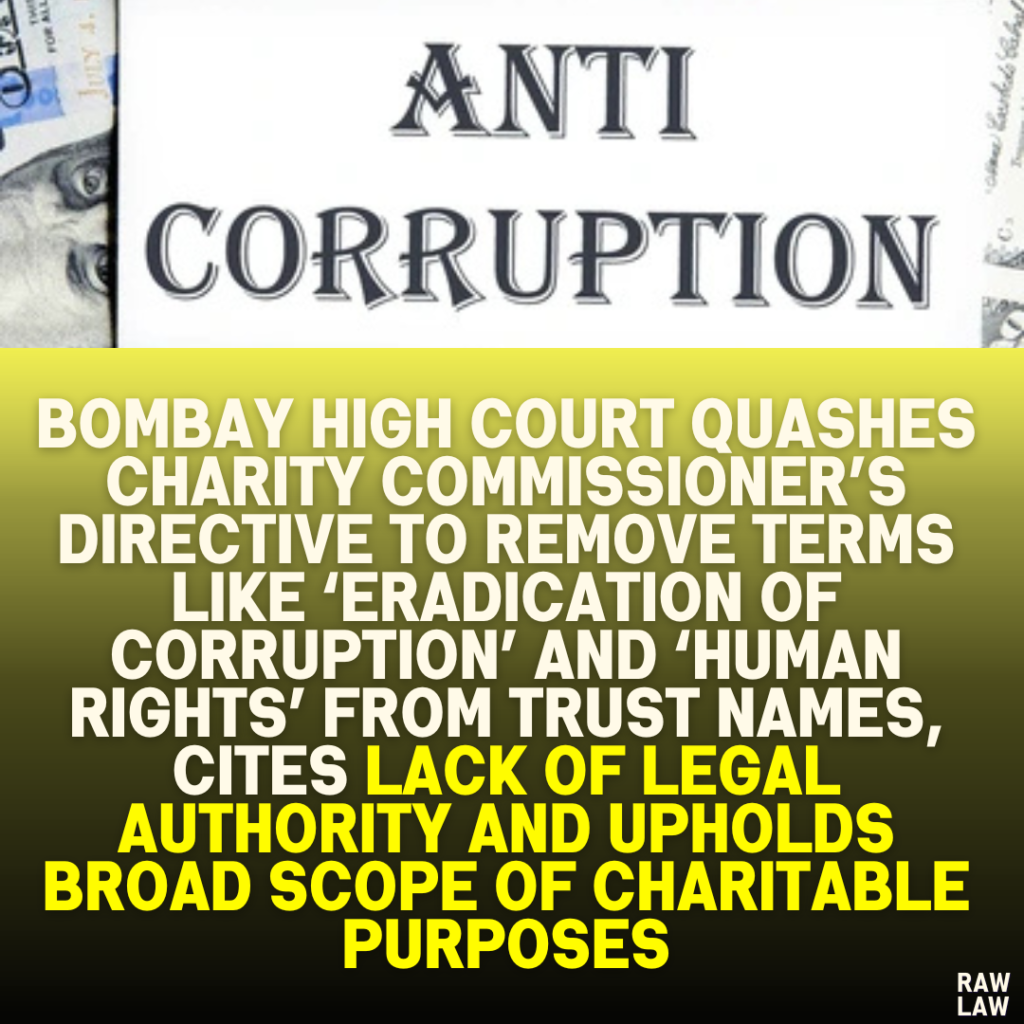Court’s Decision
The Bombay High Court quashed Revised Circular No. 543 issued by the Charity Commissioner, which directed registered trusts to remove phrases like “Bhrashtachar Nirmulan” (Eradication of Corruption) and “Human Rights” from their names. The Court held that the Circular lacked legal authority under the Maharashtra Public Trusts Act, 1950, and was inconsistent with the statutory definition of “charitable purpose.”
The Court clarified that the Act did not empower the Charity Commissioner to mandate name changes unless explicitly provided for by law. It emphasized that issues of impersonation or misuse must be addressed individually and not through blanket directives.
Facts
- The petitioners, a registered trust, challenged a circular issued by the Charity Commissioner of Maharashtra dated July 4, 2018.
- The Circular instructed trusts with phrases like “Bhrashtachar Nirmulan” or “Human Rights” in their names to remove them, claiming these terms could mislead the public into believing such trusts held powers akin to government bodies.
- The petitioners argued that their name reflected their legitimate objectives under the Act and that the directive was arbitrary and beyond the Charity Commissioner’s authority.
- The Charity Commissioner justified the directive, stating it was necessary to prevent misuse and public confusion.
Issues
- Whether the Charity Commissioner under the Maharashtra Public Trusts Act, 1950, has the authority to direct trusts to change their names.
- Whether the objectives of “eradication of corruption” or “protection of human rights” can qualify as “charitable purposes” under Section 9 of the Act.
Petitioner’s Arguments
- Lack of Statutory Authority: The petitioners contended that the Public Trusts Act does not provide any provision allowing the Charity Commissioner to mandate name changes.
- Broad Definition of Charitable Purpose: They argued that their objectives aligned with “advancement of any other object of general public utility,” a legitimate charitable purpose under Section 9.
- Distinction from Other Laws: The petitioners pointed out that laws like the Companies Act, 2013, and the Maharashtra Societies Registration Act explicitly empower authorities to reject names deemed undesirable, but no such provision exists in the Public Trusts Act.
- Case-by-Case Action: They maintained that misuse of names, if any, should be addressed individually rather than through a general directive.
Respondent’s Arguments
- Public Interest and Misuse Prevention: The State argued that phrases like “Human Rights” or “Bhrashtachar Nirmulan” could mislead the public into believing these trusts had state-like powers, potentially causing harm.
- Safeguarding Public Trust: The directive aimed to ensure transparency and protect the public from being deceived by trusts using such phrases.
- Legal Backing: The respondents claimed that the Circular was issued under the Charity Commissioner’s general powers to supervise and regulate trusts.
Analysis of the Law
- Section 9 of the Maharashtra Public Trusts Act:
- The Court noted that charitable purposes include relief of poverty, education, medical relief, and “advancement of any other object of general public utility.”
- The definition is broad and covers various objectives aimed at public welfare.
- Statutory Limitations:
- Unlike the Companies Act, 2013, or the Maharashtra Societies Registration Act, the Public Trusts Act does not grant the Charity Commissioner authority to reject or alter a trust’s name based on its wording.
- Any provision restricting names would require explicit legislative backing, which is absent in the Act.
- Circular’s Legality:
- The Circular’s reasoning contradicted the broad scope of charitable purposes under Section 9.
- The directive failed to demonstrate how the use of such phrases inherently misled the public or caused harm.
Precedent Analysis
- South India Textiles v. Government of A.P.:
- Courts held that using phrases like “India” in an entity’s name does not imply state endorsement or misuse.
- New Indian Public School Society v. State of Rajasthan:
- Similarly, using terms like “National” or “India” was deemed insufficient to assume impersonation of the government.
- Human Rights Watch v. Inspector of Police (Madras High Court):
- A circular restricting the use of “Human Rights” in names was upheld under the Tamil Nadu Societies Registration Act, which has specific provisions for such regulation.
- The Bombay High Court distinguished this case, stating that the Maharashtra Public Trusts Act does not include similar provisions.
Court’s Reasoning
- Absence of Statutory Backing:
- The Court highlighted that the Public Trusts Act does not empower the Charity Commissioner to dictate changes to registered trust names.
- Misuse of names or impersonation should be addressed under specific laws like the Emblems and Names (Prevention of Improper Use) Act, 1950.
- Broad Definition of Charitable Purpose:
- Objectives like fighting corruption or protecting human rights fall within “advancement of any other object of general public utility” under Section 9.
- The Circular’s interpretation, limiting these as non-charitable, was inconsistent with established legal principles.
- Case-Specific Action Required:
- The Court emphasized addressing misuse or impersonation on a case-by-case basis. Blanket directives undermine legitimate activities and the autonomy of trusts.
- Practical Implications:
- Changing trust names based on the Circular’s reasoning would set a precedent affecting numerous legitimate organizations.
- The Court dismissed concerns about misuse by observing that mere inclusion of such phrases does not equate to impersonation or illegality.
Conclusion
The High Court quashed the Circular, stating that it exceeded the Charity Commissioner’s statutory powers. The judgment clarified that objectives like fighting corruption and protecting human rights are valid charitable purposes under the Act. The Court emphasized addressing specific violations individually through existing legal frameworks.
Implications
- Reinforcement of Trust Autonomy: The judgment protects the rights of trusts to define their objectives within the broad framework of charitable purposes.
- Need for Legislative Clarity: The ruling underscores the absence of provisions in the Public Trusts Act to regulate trust names, highlighting the need for explicit legislative amendments if required.
- Enhanced Accountability: The Court’s decision ensures that action against misuse or impersonation is taken through proper legal channels, safeguarding both public interest and trust operations.
